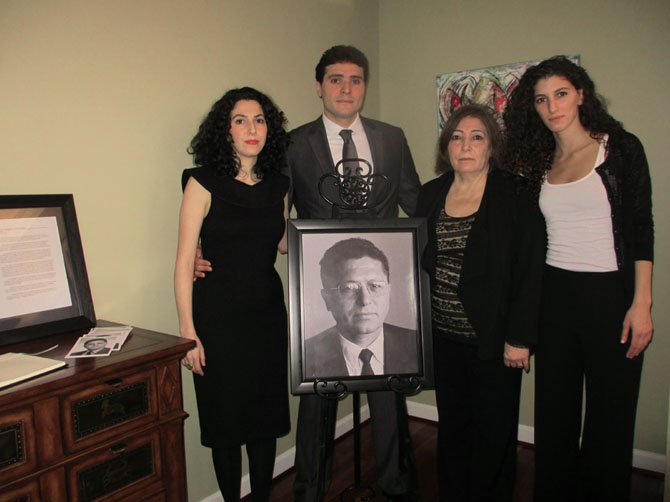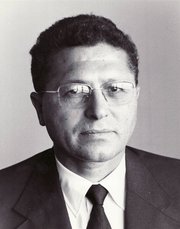The family of kidnapped Libyan human rights activist Mansur Rashid Kikhia commemorated his life and legacy on Saturday, Jan. 12, 2013. From left, Bisan Toron, Rashid Mansur Kikhia, widow Baha Omary Kikhia and Jihan Kikhia. Photo by Donna Manz.
Nineteen years ago, on Dec. 10, 1993, Libyan human rights activist and lawyer Mansur Rashid Kikhia, was kidnapped from his hotel room in Cairo, Egypt and spirited out of the country. Last month—December, 2012—Kikhia’s death in Tripoli was confirmed to his family, now living in the Vienna and McLean areas. On Saturday, Jan. 12, Kikhia’s family and friends celebrated the life of a man dedicated to human rights for all.
“Mansur Kikhia was advocating for democracy and the protection of human rights and freedom for all the Arab nations since the beginning of his career,” said daughter Jihan Kikhia. “He was a visionary, which made him an early pioneer of the recent revolution in Libya.”
Mansur Rashid Kikhia served as Libyan Minister of Foreign Affairs from 1972 to 1973, Libyan Ambassador to the United Nations, and Permanent Libyan Representative to the United Nations. At the U.N., Kikhia served as president of the U.N. Security Council in September 1976 and in October 1977. He was a leader in promoting and creating the International Day of Persons with Disabilities in the United Nations.
In protest to the killing and torture perpetrated by Al-Gaddafi’s regime, Kikhia resigned from the Libyan government in 1980, publicly protesting against government-supported atrocities. After he separated himself from the Libyan government, he continued his opposition movement in Paris, France.
“Mansur was probably kidnapped because he was seen by the Gaddafi regime as a great threat to his government.”
—Family friend and supporter Larry Ekin
“Mansur Kikhia's story highlights the need for humankind to constantly work hard to protect and promote our most basic human rights, even in the face of life's most difficult struggles,” said Kikhia.
Family and friends say that Kikhia was a leading opposition figure to Muammar Al-Gaddafi, and they suspect it was pro-Al-Gaddafi supporters behind the kidnapping. Kikhia aimed to unite Libya’s opposition groups to create a powerful front against Al-Gaddafi’s oppressive regime, said Mansur Rashid Kikhia’s daughter, Jihan “Jiji” Kikhia. When Kikhia disappeared from Cairo, he was attending an Arab Organization for Human Rights meeting, of which he was a founder. International Human Rights Day falls on Dec. 10.
Family friend and supporter Larry Ekin also believes that it was supporters of Gaddafi that kidnapped Kikhia, possibly with the cooperation of people inside Egypt. “How else did they spirit him out of the country,” Ekin asks.
“Mansur was probably kidnapped because he was seen by the Gaddafi regime as a great threat to his government,” said Ekin. “Not because of military might but because of his integrity and credibility. He had the reputation and the ability to unite various groups in opposition to Gaddafi’s regime. He also had credibility with the U.N.”
With Gaddafi’s fall and death Kikhia’s case was reopened. In December of 2012, Kikhia’s death was confirmed to his family.
“So, although the end of his life was a tragedy, we are here to acknowledge and commend what he did while he was a free man with a heroic vision in a world full of limitations,” said Kikhia. “We are fighting for the completion of his story and to honor his life as he selflessly did for others.”

